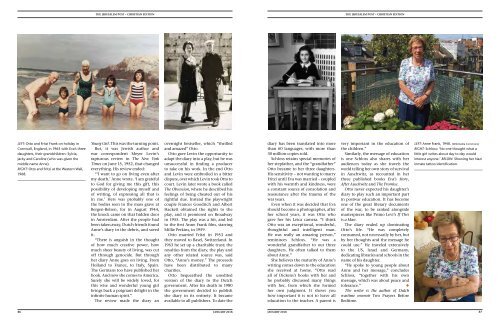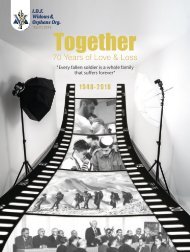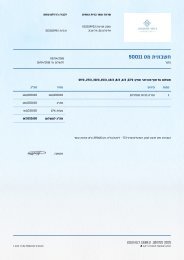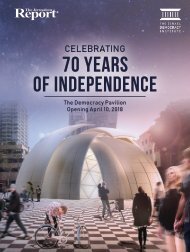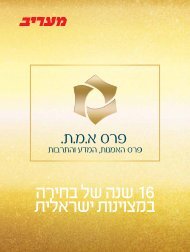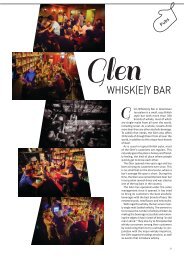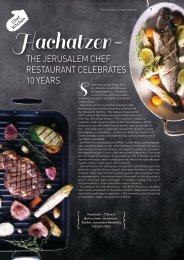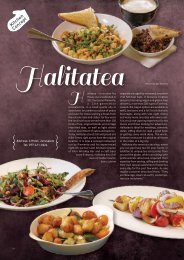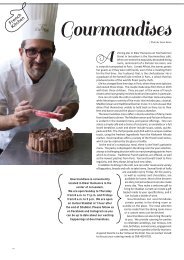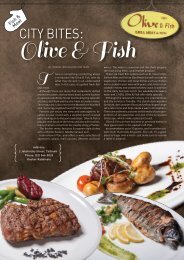CHE-_0_0_0_DoublePages+seg1
Create successful ePaper yourself
Turn your PDF publications into a flip-book with our unique Google optimized e-Paper software.
THE JERUSALEM POST • CHRISTIAN EDITION<br />
THE JERUSALEM POST • CHRISTIAN EDITION<br />
LEFT: Otto and Fritzi Frank on holiday in<br />
Cornwall, England, in 1965 with Eva’s three<br />
daughters, their grandchildren: Sylvia,<br />
Jacky and Caroline (who was given the<br />
middle name Anne).<br />
RIGHT: Otto and Fritzi at the Western Wall,<br />
1968.<br />
Young Girl. This was the turning point.<br />
But, it was Jewish author and<br />
war correspondent Meyer Levin’s<br />
rapturous review in The New York<br />
Times on June 15, 1952, that changed<br />
everything. His review ended:<br />
“‘I want to go on living even after<br />
my death,’ Anne wrote. ‘I am grateful<br />
to God for giving me this gift, this<br />
possibility of developing myself and<br />
of writing, of expressing all that is<br />
in me.’ Hers was probably one of<br />
the bodies seen in the mass grave at<br />
Bergen-Belsen, for in August 1944,<br />
the knock came on that hidden door<br />
in Amsterdam. After the people had<br />
been taken away, Dutch friends found<br />
Anne’s diary in the debris, and saved<br />
it.<br />
“There is anguish in the thought<br />
of how much creative power, how<br />
much sheer beauty of living, was cut<br />
off through genocide. But through<br />
her diary Anne goes on living. From<br />
Holland to France, to Italy, Spain.<br />
The Germans too have published her<br />
book. And now she comes to America.<br />
Surely she will be widely loved, for<br />
this wise and wonderful young girl<br />
brings back a poignant delight in the<br />
infinite human spirit.”<br />
The review made the diary an<br />
overnight bestseller, which “thrilled<br />
and amazed” Otto.<br />
Otto gave Levin the opportunity to<br />
adapt the diary into a play, but he was<br />
unsuccessful in finding a producer<br />
to take on his work. In the end Otto<br />
and Levin were embroiled in a bitter<br />
dispute, over which Levin took Otto to<br />
court. Levin later wrote a book called<br />
The Obsession, where he described his<br />
feelings of being cheated out of his<br />
rightful due. Instead the playwright<br />
couple Frances Goodrich and Albert<br />
Hackett obtained the rights to the<br />
play, and it premiered on Broadway<br />
in 1955. The play was a hit, and led<br />
to the first Anne Frank film, starring<br />
Millie Perkins, in 1959.<br />
Otto married Fritzi in 1953 and<br />
they moved to Basel, Switzerland. In<br />
1963 he set up a charitable trust; the<br />
royalties from the diary, the play and<br />
any other related source was, said<br />
Otto, “Anne’s money.” The proceeds<br />
have been distributed to many<br />
charities.<br />
Otto bequeathed the unedited<br />
version of the diary to the Dutch<br />
government. After his death in 1980<br />
the government decided to publish<br />
the diary in its entirety. It became<br />
available to all publishers. To date the<br />
diary has been translated into more<br />
than 60 languages, with more than<br />
30 million copies sold.<br />
Schloss retains special memories of<br />
her stepfather, and the “grandfather”<br />
Otto became to her three daughters.<br />
His sensitivity – not wanting to marry<br />
Fritzi until Eva was married – coupled<br />
with his warmth and kindness, were<br />
a constant source of consolation and<br />
reassurance after the trauma of the<br />
war years.<br />
Even when it was decided that Eva<br />
should become a photographer, after<br />
her school years, it was Otto who<br />
gave her his Leica camera. “I think<br />
Otto was an exceptional, wonderful,<br />
thoughtful and intelligent man.<br />
He was really an amazing person,”<br />
reminisces Schloss. “He was a<br />
wonderful grandfather to our three<br />
daughters. He often talked to them<br />
about Anne.”<br />
She believes the maturity of Anne’s<br />
writing comes down to the education<br />
she received at home. “Otto read<br />
all of Dickens’s books with her and<br />
he probably discussed many things<br />
with her, from which she formed<br />
her own judgment. It shows you<br />
how important it is not to leave all<br />
education to the teacher. A parent is<br />
very important in the education of<br />
the children.”<br />
Similarly, the message of education<br />
is one Schloss also shares with her<br />
audiences today as she travels the<br />
world telling her own story of survival<br />
in Auschwitz, as recounted in her<br />
three published books Eva’s Story,<br />
After Auschwitz and The Promise.<br />
Otto never expected his daughter’s<br />
diary to play such an important part<br />
in postwar education. It has become<br />
one of the great literary documents<br />
of the war, to be ranked alongside<br />
masterpieces like Primo Levi’s If This<br />
is a Man.<br />
The diary ended up dominating<br />
Otto’s life. “He was completely<br />
consumed, not necessarily by her, but<br />
by her thoughts and the message he<br />
could use.” He traveled extensively<br />
to the US, Israel and Germany,<br />
dedicating libraries and schools in the<br />
name of his daughter.<br />
“He spoke to young people about<br />
Anne and her message,” concludes<br />
Schloss, “together with his own<br />
message, which was about peace and<br />
tolerance.” <br />
◆<br />
The writer is the author of Dutch<br />
wartime memoir Two Prayers Before<br />
Bedtime.<br />
LEFT: Anne Frank, 1940. (Wikimedia Commons)<br />
RIGHT: Schloss: ‘No one thought what a<br />
little girl writes about day to day would<br />
interest anyone.’ BELOW: Showing her Nazi<br />
inmate tattoo identification.<br />
36 JANUARY 2018<br />
JANUARY 2018 37


